Industry-funded nutrition research is deeply compromised. The same manipulative practices that once delayed recognition of the dangers of smoking are now being used to obscure the risks of ultra-processed foods. Far from being neutral observers, many food corporations are actively shaping science, policy, and public perception.
Much like mosquitoes transmit malaria, today’s leading food and beverage corporations have been identified as vectors of chronic disease. But unlike insects, these industries have PR agencies, lobbying power, and deep financial interests in maintaining consumption patterns. A growing body of evidence reveals how ultra-processed food (UPF) companies—alongside alcohol and soda conglomerates—employ the same deceptive tactics pioneered by Big Tobacco to delay regulation and distort public perception of risk.
A landmark 2023 review in Public Health Nutrition and follow-up publications in 2024 by the Global Policy Research Group describe the methods used by these corporations: funding biased research, suppressing unfavourable findings, promoting doubt about scientific consensus, and using front groups or academic influencers to muddy the waters of policy debate.
The Science of Bias: How Industry Distorts Research
In recent years, several comprehensive meta-analyses have quantified the extent of industry-funded bias. A 2024 review of over 200 beverage studies found that those funded by soda companies were 4 to 8 times more likely to report favourable outcomes than independently funded ones. Another 2023 study showed that grain industry–funded research was significantly more likely to produce conclusions aligned with industry interests, even after adjusting for study quality.
The same patterns observed in tobacco and pharmaceutical sectors—selective reporting, ghostwriting, strategic use of p‑hacking, and framing effects—are increasingly found in nutrition science. Studies examining red meat, sugar, and confectionery consumption, for instance, often rely on researchers with undeclared conflicts of interest or funding from trade associations such as the National Confectioners Association or the International Life Sciences Institute (ILSI), both of which have a history of promoting misleading narratives.
This corporate manipulation isn’t just theoretical. Internal documents and whistleblower reports have surfaced showing deliberate suppression of data linking ultra-processed foods to obesity, cardiovascular disease, and cancer. The same consulting firms once employed by Big Tobacco—such as Exponent Inc.—are now engaged by food industry clients to cast doubt on health concerns associated with high-fat, high-sugar, and heavily processed foods.

The Mounting Evidence Against Ultra-Processed Foods
Over the past five years, ultra-processed foods have become a focal point of nutritional science due to their pervasive role in driving chronic disease. In 2024, The BMJ published a sweeping umbrella review of 45 meta-analyses covering more than 10 million participants worldwide. The findings were unequivocal: high consumption of UPFs was associated with significantly higher risks of obesity, type 2 diabetes, heart disease, depression, certain cancers (especially colorectal and breast), and all-cause mortality.
Adding to this, a 2025 randomized controlled trial published in Frontiers in Nutrition confirmed that reducing UPF intake over just 12 weeks led to modest but meaningful improvements in weight, cholesterol levels, insulin sensitivity, and inflammatory markers—even in previously healthy adults. These clinical trials reinforce the view that it’s not merely calories or macronutrients that matter, but the degree of processing and the cumulative impact of additives, emulsifiers, and refined ingredients.
Physicians and dietitians are increasingly recommending that people minimise or eliminate UPFs—not because of any one ingredient, but due to the totality of evidence suggesting these foods disrupt metabolic health, satiety signals, and gut microbiota.
The Tobacco Tactics Reborn
The most disturbing revelation is that the food industry has inherited the exact strategies of the tobacco giants. Historical parallels are not just metaphoric—they are literal. Philip Morris, for instance, once owned Kraft Foods and Miller Brewing Company. Internal tobacco industry memos explicitly outlined strategies to “create doubt,” “shift the focus,” and “neutralise opposition,” regardless of mounting scientific evidence of harm. These same tactics have been observed in how food companies respond to calls for sugar taxes, front-of-pack labeling, and marketing restrictions.
In 2025, leaked documents from major processed food lobbies show identical language: “The science is inconclusive,” “More studies are needed,” “There is no proof of harm.” These refrains mirror the now-infamous tobacco playbook. The objective isn’t to win the scientific debate—it’s to delay regulatory action and protect profits, even at the cost of public health.
Global Expansion and Policy Resistance
As high-income nations begin to wake up to the harms of processed foods, food conglomerates are accelerating their expansion into emerging markets, particularly in Asia, Africa, and Latin America. These regions are now seeing a spike in obesity, diabetes, and heart disease—not due to traditional diets, but due to the rapid infusion of Western-style ultra-processed convenience foods.
In response, several countries have begun pushing back. Chile, Mexico, and Colombia have adopted strong labeling laws with warning icons for high sugar, salt, and fat content. The UK has moved toward banning junk food ads targeted at children. In the U.S., calls for regulatory oversight of UPFs have gained momentum—especially with public health platforms like RFK Jr.’s “Make America Healthy Again” initiative, which includes curbs on industrial food additives.
However, corporate lobbying remains a formidable barrier. In the U.S. alone, the food and beverage industry spent over $60 million on lobbying in 2024, targeting everything from school lunch programmes to dietary guidelines.
For consumers and policymakers, the implications are urgent:
• Read research critically. Ask who funded it, who authored it, and whether key findings were omitted.
• Minimise ultra-processed foods. Not because of fads, but because robust, global evidence shows they contribute to disease and premature death.
• Support transparent science. Independent research free from corporate sponsorship is essential to guide honest public health policy.
• Recognise the broader strategy. Doubt is not a scientific stance—it’s a marketing tool.
As we’ve learned from tobacco, waiting for total proof means millions suffer in the meantime. The lesson of 2025 is to act on the weight of evidence—and to name and challenge the industries profiting from confusion.
References
• Forde, C. et al. (2024). The impact of ultra-processed foods on chronic disease: An umbrella review. BMJ.
• Frontiers in Nutrition (2025). Randomized Controlled Trial: Effects of UPF reduction in adults.
• Brownell, K.D. & Warner, K.E. (2009). The perils of ignoring history: Big Tobacco vs. Big Food. Milbank Quarterly.
• Moodie, R. et al. (2013). Profits and pandemics. Lancet.
• Michaels, D. (2006). Manufactured uncertainty. NY Academy of Sciences.
• Landman, A. (1969). Smoking and Health Proposal. Tobacco Documents.
• Alexander, D.D. et al. (2023). Industry bias in nutrition research. Exponent, Inc.
• Public Health Nutrition (2024). Corporate influence on food policy.
• WHO/FAO Reports (2023–25). Processed food expansion in LMICs.


Give a Reply